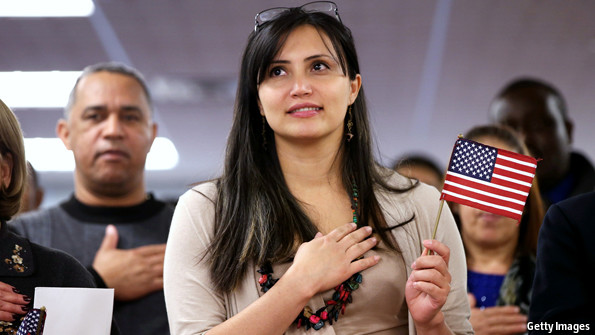 The 2008 economic crisis showed Americans two truths about immigration that was only openly known by immigrants to the United States. One issue was the fact that even with illegal immigration, there is a strong second generation of the children of immigrants and those who had come to the U.S. when they were very young that have grown up and speak and think as most American kids do in 2013. The second realization was that many illegal immigrants were not in the U.S. to become cultural Americans and live and grow as Americans, but were in the U.S. to simply make enough money to live off of in order to return back home in comfort.
The 2008 economic crisis showed Americans two truths about immigration that was only openly known by immigrants to the United States. One issue was the fact that even with illegal immigration, there is a strong second generation of the children of immigrants and those who had come to the U.S. when they were very young that have grown up and speak and think as most American kids do in 2013. The second realization was that many illegal immigrants were not in the U.S. to become cultural Americans and live and grow as Americans, but were in the U.S. to simply make enough money to live off of in order to return back home in comfort.
In the last presidential election, to be Latino in some states meant that you might have had to wait hours longer to vote than your other American cousins, if you were able to vote at all due to early closing of election booths. This offense against American democracy likely did more to polarize Latinos to vote for President Obama and all other future democrats than any other wedge issue. Currently, the debate on the new immigration bill has as much to do with the future of the Republican party as it does with the immigration issue itself. Many Republicans realise that to earn their seats and to win the Presidency, they need to stop alienating non-traditional Americans and represent all Americans in a diplomatic and equal fashion. This divide among Republicans will give the democrats enough opposition support to pass the immigration reform bill, which is the only other option other than the dysfunctional status quo.
The status quo is not so much of an immigration policy, but more of a wall against anyone who might be perceived as a threat to an old idea of the United States. Those children of illegal immigrants know nothing more than being Americans, and to prohibit anyone in the United States from using their skills and knowledge to put themselves in a better position in society is inherently un-American. Those kids under the immigration laws of the last few years would be considered as criminals for doing what all Americans are encouraged to do, that is to better their position in society and to contribute to society as a whole. Policy changes to make their American kids officially able to live and act as citizens had to pass beyond the status quo, as those kids know nothing more in their lives than living as Americans.
Some Republicans see an opening of the immigration system as a catalyst to letting in millions more people who will expect citizenship. The reality is that while this will occur and has been occurring, people often come to the U.S. to make extra money and then return home. The level of development in Northern Mexico and Central America will always create a huge incentive for those wanting to come to the United States, and a physical and policy wall has never stopped masses of people coming into the United States. Recent immigration trends have shown than net immigration to the U.S. from Mexico has been zero, as without work, people did not come to the U.S. to take employment. This shows that many are not coming to the U.S. to change America’s cultural landscape, but to simply work and make their own communities back home better.
Some Republicans have accepted some policy changes and are supporting the reform of the current immigration system as they want to win some elections in the future and realise the status quo is not benefitting anyone. The conservative nature of many new Americans, Latino or otherwise, will create a natural base for the Republican party and keep many churches functioning. As Americans become more secular, immigrants remain and develop their communities with the help of religious leaders. A clash of policy will occur as conservatives and liberals try to encourage the Latino vote in policy development to the benefit or detriment to other groups in American society. In the end, anyone who wants to become an American will work hard to do so, and will become part of the great American policy debate on all things important to all Americans.